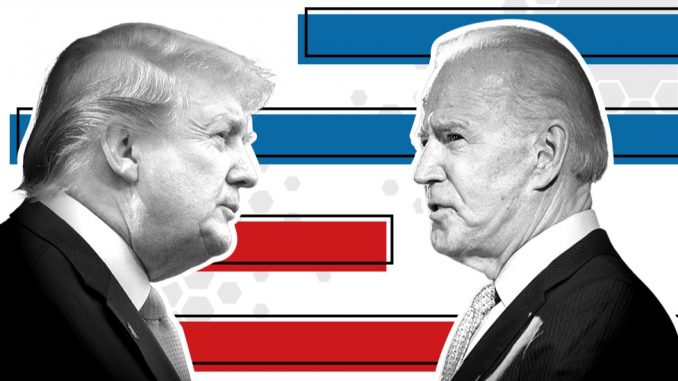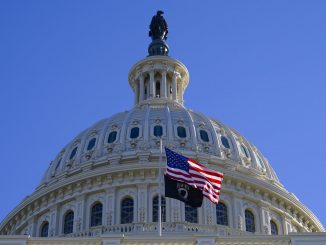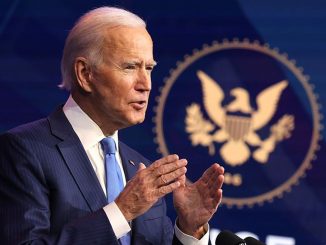
Joe Biden, a Democrat will carry Arizona in a presidential election, a monumental shift for a state that was once a Republican stronghold, for just the second time in more than seven decades.
CNN projected on Thursday that President-elect Joe Biden will carry Arizona, defeating President Donald Trump and providing Democrats in Arizona and the universe of allied grassroots organizations in the state with a crowning achievement a decade in the making.
Biden’s win in the state that propelled Republican leaders like Barry Goldwater and John McCain to national prominence could foretell problems for the party going forward. Three key shifts in the state helped Democrats this year: a growing Latino population that leans Democratic, a surge in voters moving to Arizona from more liberal states like California and Illinois, and the way suburban voters have starkly broken with a Republican Party led by someone like Trump.
Arizona, by going blue, is moving closer to its neighbor to the northwest — Nevada, where Democrats have taken control of almost all aspects of government — and away from the state’s traditional rightward bent.
The Democratic victory — declared days after CNN projected Biden’s win in the presidential race — was anchored by Maricopa County, home to Phoenix and nearly 60% of all people in the state. Maricopa is the fastest-growing county in the country, transforming over the last two decades into a sprawling mass of metropolitan hubs, sun-scorched planned communities and bustling strip malls.
“Maricopa County won the state of Arizona for Mark Kelly and Joe Biden,” said Steven Slugocki, chair of Maricopa County’s Democrats. “Here in Maricopa, we committed our resources to contact voters of color, women and traditionally underrepresented groups throughout the state. Our strategy proved to be effective.”
Biden is just the second Democrat to win Arizona since 1948, when Harry Truman won. Bill Clinton narrowly won the state in 1996, but Arizona moved further right in the next two decades, electing hard-line immigration proponents like Gov. Jan Brewer and Maricopa County Sheriff Joe Arpaio and passing laws like SB 1070, a controversial state law that required officers to make immigration checks while enforcing other laws if “reasonable suspicion” of illegal immigration exists.
ALSO READ: How Donald Trump lost US Presidential Election 2020
The Democratic victory builds on the work by grassroots organizations on the ground in Arizona, many of which focused on the state’s growing Latino population by uniting around the opposition to Arpaio and the immigration crackdown. Those groups provided the state’s Democratic apparatus — which had few wins to brag about back in 2010 — with the building blocks needed to grow into an influential force able to win a Senate seat in 2018, and, just two years later, the other Senate seat and the presidential race.
“This year was a victory for the decade-plus of work in this state,” said Laura Dent, the executive director of Chispa Arizona, one of a number of organizations that have formed a coalition called Mi AZ, an alliance of six groups that have worked to engage voters, particularly Latinos, for years. “It has been a decade-plus of building and the sustained work of organizing between electoral cycles have been critical.”
Dent said the organizing around SB 1070 was a “catalyst” for these groups to unify around something and “build that collective power” on display this year. Just since 2018, Chispa Arizona alone has registered 44,000 voters, and it made 1.3 million calls to voters this year in Arizona.
This shift in Arizona will also be felt back in Washington, DC, as the party’s top operatives attempt to figure out how they lost a state like Arizona, which just six years ago was seen as a Republican lock. The key question: Will the rising Democratic organization in the state put Arizona further out of reach in the years to come?
“I thought by 2024, Arizona would be for real a swing state,” said Yasser Sanchez, an immigration lawyer who volunteered for Republican Mitt Romney’s 2012 presidential campaign and worked for McCain’s 2016 reelection to the Senate before rejecting a Trump-led Republican Party and helping organize Latino voters for Biden. “Every time I heard it would be before, I thought that was wishful thinking.”
Looming over Biden’s victory is the legacy of McCain, an Arizona stalwart whose “maverick” conservatism carried a coalition of Democrats, independents and Republicans for years in the state. Trump and McCain had a tense relationship, and when the senator cast a vote against the President’s Obamacare repeal bill, the tension exploded, leading Trump to double down on his mocking attacks of the Republican senator, even after he died in 2018. This, along with comments Trump reportedly made about military members and veterans, spurred McCain’s widow, Cindy McCain, to back Biden, an endorsement that was front page news in the state.
Republicans like Chad Heywood, the former executive director of the Arizona Republican Party, argued that the Democratic victory did not portend a significant shift in the state.
“This was a purple state that looked red during the Obama years,” said Heywood, adding that if the President ends up losing the state by less than 3 percentage points, it wasn’t “a massive sea change in Arizona.”
But Arizona was considered so reliably red in 2014 that a study by the Massachusetts Institute of Technology and the University of California-Los Angeles dubbed Mesa — a sprawling suburb east of Phoenix — the “most conservative American city.”
“Ten years ago, if you wanted to be politically relevant and if you wanted your vote to have an impact, you were foolish to be registered as a Democrat because they failed to field a candidate for some offices,” said Mesa Mayor John Giles, a registered Republican in a nonpartisan job. “And even then, it was just volunteering to get killed in the general by the Republican.”
In the last decade, however, Mesa — like much of the area around Phoenix — has grown more racially and politically diverse, leading Giles to say, “That certainly is no longer the case now. It is extremely competitive.”
A key reason, Giles said, was people moving to the area — like Amie Schaefer, a Biden-backing transplant from Chicago who moved to Phoenix in 2019.
“I am hoping to change the state blue,” Schaefer said after casting her ballot. “Believe me, I have tried to turn everybody that I can possibly turn.”
As much as Arizona is changing because of people like Schaefer, it is also shifting because of registered Republicans like Joe Hudock, a 62-year-old computer engineer from Phoenix who voted for Romney in 2012 and was a big fan of McCain. But Hudock, along with his wife, Chris, voted for Biden in 2020.
“Trump is dangerous for the country,” Hudock said after voting days before the election. “In the last four years, Republicans have shown their true colors. … I just wish there was a centrist party.”
Another reason Democrats believe they were competitive in Arizona was the coronavirus, which rocked the state over the summer, in part because of the state government’s decision to let its stay-at-home order expire in May.
Before the coronavirus, national Republican officials told CNN there is “no question” Arizona was a key battleground but that they were “not concerned about Arizona turning blue.”
That quickly changed as the virus spread throughout the state, with more than 160,000 cases and 3,600 people dying in Maricopa County alone.
The impact of the virus could be felt among both Trump and Biden supporters. Those backing the President often gave him the benefit of the doubt on the virus, arguing he was being unfairly maligned and suggesting that Biden would be too eager to shut down the economy again to get the virus under control. For many Biden supporters, coronavirus was front of mind and many blamed Trump, oftentimes citing personal experiences with the pandemic as part of the reason they chose to back Biden.
“The way Biden reacted to certain things (about the virus) gave me a different perspective on how much he cares,” said Nikki Towns, an 18-year-old from Chandler who cast her first ballot for Biden. On Trump’s handling of the virus: “I feel like he hasn’t really handled it. It is being ignored.”
Biden’s win in Arizona was not for a lack of trying on Trump’s part. The President held seven events in the state in 2020. Biden held one event after the Democratic National Convention over the summer, a bus tour around Maricopa in October.
To Slugocki, those visits did little to break through the voters’ focus on education, health care and the economy.
“Clearly, voters wanted something new from Arizona. Voters were energized and enthused to vote. Maricopa County’s elections are safe, secure and transparent,” said the county party chair. “A bright future is ahead for Maricopa County and I couldn’t be prouder.”




